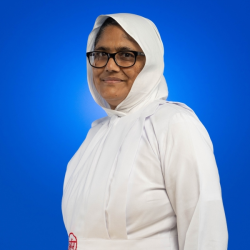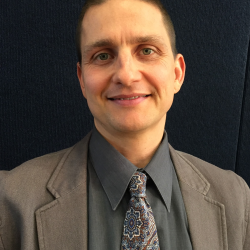
Jain Contemplative Practices
Oct 13, 2025
8:00 - 9:30 AM PDT
Presiding: Anne Vallely, Associate Professor, University of Ottawa

Vallely is the founder of the Contemplative Studies and Well-being program, Animal Studies, and the new End of Life Studies program, which integrates contemplative practices to support psychological, philosophical, and spiritual reflection on finitude and grief. She is also the co-founder of the MA in Psychedelics and Consciousness Studies. Her research is situated within the broad field of the Anthropology of Religion, with a focus on South Asian religions, particularly Jainism. Her interests span human–non-human boundaries, nature and spirituality, death and mourning, devotional practices and non-ordinary states of consciousness. Methodologically, she approaches these areas through the lens of phenomenology and the aesthetics of religious experience. Vallely is currently undertaking a new research project exploring the connection between Jain introspective practices and the distinct states of consciousness they aim to cultivate—such as compassion, equanimity, and nondogmatic thinking.
“Jain Contemplative Practices”
Presenter: Samani Pratibha Pragya, Visiting Assistant Teaching Professor, Florida International University

Dr. Samani Pratibha Pragya is a scholar of Jain Studies and her specializations include Modern Jain Yoga, Comparative Religion & Philosophy, Meditation & Spirituality and Jain Terapanth lineage, to which she belongs as a Samani (saint). At present she is working as Visiting Assistant Teaching professor at Florida International University, Miami, USA. Her current research centres on the history and methods of modern Jain meditation and yoga. She received her PhD on “Prekṣā Meditation: History and Methods” from SOAS.
“Modernising Anuprekṣā: Ācārya Mahāprajña’s Transformative Vision of Jain Contemplative Practice”
The term contemplation (anuprekṣā) refers to an ancient Jain meditative practice that is based on continued thinking about religious subjects with a soteriological purpose. The Uttarādhyayana sūtra (30:34, 29:23) describes the daily routine of ascetics which consists of the practice of five types of svādhyāya; anuprekṣā is one of them. Anuprekṣā is a component of dharma-dhyāna and śukla-dhyāna. A notable shift takes place in the systematisation of anuprekṣa in the modern framework of prekṣā-dhyāna of Ācārya Mahāprajña (1920-2010). This framework differs from the traditional forms of anuprekṣā we find in the Jain canon and the Tattvartha Sūtra (9.7) in its emphasis on secular goals such as contemplation on the transformation and development of one’s personality, value inculcation, health and well-being, and even contemplation on nationality. In fact, Mahāprajña developed more than twenty-five new contemplations and he incorporated several innovated steps from prekṣā-dhyāna in the practice of anuprekṣā. Most importantly, relaxation (kāyotsarga), colour visualisation (leśyā-dhyāna), concentration on psychic centres (caitanya-kendra) in the body, and positive affirmation with autosuggestion (vidhāyaka-anucintan). He moreover presented this modern form of contemplation in the secular framework of the conscious and subconscious mind.
This presentation will show that modern innovations in Jain contemplation have attempted to package anuprekṣā as a modern meditation tool geared towards the “purification of the psyche”, the promotion of health and well-being, as well as liberation. These aims sought to appeal to both the laity and monastics and created a “socio-spiritual” model of contemplative meditation.
This presentation will show that modern innovations in Jain contemplation have attempted to package anuprekṣā as a modern meditation tool geared towards the “purification of the psyche”, the promotion of health and well-being, as well as liberation. These aims sought to appeal to both the laity and monastics and created a “socio-spiritual” model of contemplative meditation.
Presenter: Cogen Bohanec, Assistant Professor, Arihanta Institute

Dr. Cogen Bohanec is Assistant Professor in Sanskrit and Jain Studies at Arihanta Institute and is Affiliate Assistant Professor at Claremont School of Theology (CST). He teaches courses in Sanskrit and other South Asian languages (Pāḷi, Gujarati), Jain philosophy, philosophy of religion, and comparative dharma traditions. He has also taught courses on South Asian culture, religions, and Sanskrit at the Graduate Theological Union (GTU) in Berkeley.
Dr. Bohanec specializes in the Jain, Hindu, and Buddhist traditions, with particular focus on comparative dharma studies, contemplative studies, philosophy of religion, and theo-ethics—including virtue ethics, environmental ethics, and animal ethics. A trained philologist, he is an expert in Sanskrit, Pāḷi, and Gujarati grammar, with advanced training in classical Indian literature and linguistic analysis. His scholarship includes over thirty academic publications across these disciplines. He holds a PhD in Historical and Cultural Studies of Religion with an emphasis in Hindu Studies from the GTU, where his research concentrated on ancient Indian languages, textual traditions, and philosophical systems. He also has an MA in Buddhist Studies from the Institute of Buddhist Studies at GTU, where he focused on translating Pāḷi Buddhist scriptures in conversation with the Sanskrit Upaniṣads and their philological contexts.
Dr. Bohanec is the author of Bhakti Ethics, Emotions, and Love in Gauḍīya Vaiṣṇava
Metaethics (Lexington Books, 2024), an interdisciplinary study that brings together Hindu theology, ecotheology, ecofeminism, and feminist care ethics within a framework of bhakti-centered virtue ethics and psychology of emotion. He has served as editor for several books in Jain studies, including An Introduction to Jain Philosophy Based on the Writings and Discourses of Ācārya Sushil Kumar by Parveen Jain (DK Printworld, 2019), Contemplative Studies and Jainism (Routledge, 2024), Engaged Jainism: Critical and Constructive Studies of Jain Social Engagement (SUNY Press, 2026, co-edited with Dr. Christopher Jain Miller), and Mantra Jñāna: A Passage Through the Sūkṣma Śarīra Based on the Writings and Discourses of Ācārya Sushil Kumar (by Parveen Jain, DK Printworld, 2026). His current projects continue to explore the Jain and Vaiṣṇava traditions through close textual study, philosophical inquiry, and translation of Jain Sanskrit, Prakrit, and Gujarati texts. He is actively publishing and lecturing on topics spanning religious studies, South Asian philology, ethics, and contemplative practice in both ancient and modern contexts.
Metaethics (Lexington Books, 2024), an interdisciplinary study that brings together Hindu theology, ecotheology, ecofeminism, and feminist care ethics within a framework of bhakti-centered virtue ethics and psychology of emotion. He has served as editor for several books in Jain studies, including An Introduction to Jain Philosophy Based on the Writings and Discourses of Ācārya Sushil Kumar by Parveen Jain (DK Printworld, 2019), Contemplative Studies and Jainism (Routledge, 2024), Engaged Jainism: Critical and Constructive Studies of Jain Social Engagement (SUNY Press, 2026, co-edited with Dr. Christopher Jain Miller), and Mantra Jñāna: A Passage Through the Sūkṣma Śarīra Based on the Writings and Discourses of Ācārya Sushil Kumar (by Parveen Jain, DK Printworld, 2026). His current projects continue to explore the Jain and Vaiṣṇava traditions through close textual study, philosophical inquiry, and translation of Jain Sanskrit, Prakrit, and Gujarati texts. He is actively publishing and lecturing on topics spanning religious studies, South Asian philology, ethics, and contemplative practice in both ancient and modern contexts.
“Śrīmad Rājcandra and the Architecture of Jain Contemplative Practice”
In this presentation, Dr. Cogen Bohanec explores a comprehensive framework for understanding and presenting Jain contemplative practices, emphasizing the integration of ethical, ritualistic, and meditative dimensions inherent in the Jain tradition, as presented in his edited volume “Contemplative Studies and Jainism” (Routledge, 2024). In the Introduction for this volume, Dr. Bohanec delineates core principles essential for the contextualization and preservation of contemplative traditions within academic discourse, including the avoidance of de-contextualization, the significance of first-person practitioner perspectives, and the interweaving of social justice with spiritual practices—while challenging the perception of contemplative praxis being restricted to quietude and other similar practices alone.
Through this framework, Śrīmad Rājcandra's writings serve as a profound case study, illustrating the dynamic embodiment of these principles. His Vacanāmṛta (collected writings) offers rich insights into the contemplative praxis of dhyāna, sāmāyika, and ethical cultivation, highlighting the dialectic of engagement (pravṛtti) and withdrawal (nivṛtti) both externally and internally as pivotal to spiritual development. In his discussions on meditation, Śrīmad's teachings underscore the necessity of ethical foundations, relational dynamics with advanced guides (satpuruṣa), and the transformative potential of contemplative imagery, amongst other complex themes that go far beyond mere quietude.
The presentation will analyze key selections from Śrīmad’s works, showcasing how his approach integrates meditative techniques with ethical reflection and inner transformation. By situating his contemplative vision within the broader framework of Jain contemplative practice, Dr. Bohanec establishes a model for presenting Jain practices that honors their depth, complexity, and contemporary relevance.
Through this framework, Śrīmad Rājcandra's writings serve as a profound case study, illustrating the dynamic embodiment of these principles. His Vacanāmṛta (collected writings) offers rich insights into the contemplative praxis of dhyāna, sāmāyika, and ethical cultivation, highlighting the dialectic of engagement (pravṛtti) and withdrawal (nivṛtti) both externally and internally as pivotal to spiritual development. In his discussions on meditation, Śrīmad's teachings underscore the necessity of ethical foundations, relational dynamics with advanced guides (satpuruṣa), and the transformative potential of contemplative imagery, amongst other complex themes that go far beyond mere quietude.
The presentation will analyze key selections from Śrīmad’s works, showcasing how his approach integrates meditative techniques with ethical reflection and inner transformation. By situating his contemplative vision within the broader framework of Jain contemplative practice, Dr. Bohanec establishes a model for presenting Jain practices that honors their depth, complexity, and contemporary relevance.
Speakers
This series is complete. To find out about our other events see our Events Page.


